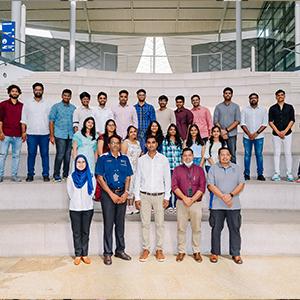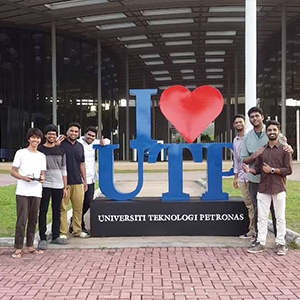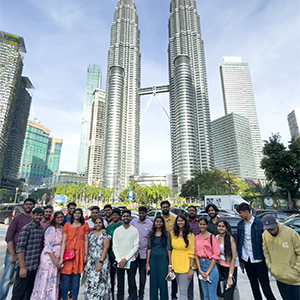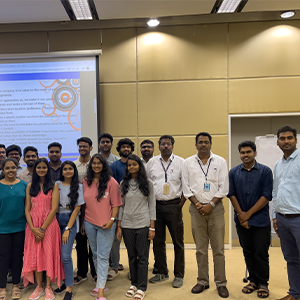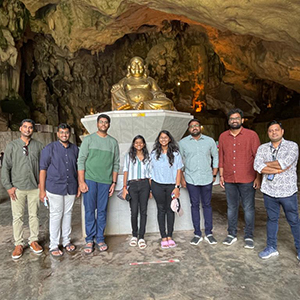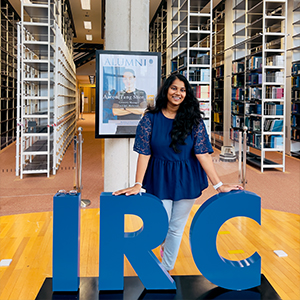- Global Immersion at UTP, Malaysia July 1, 2022
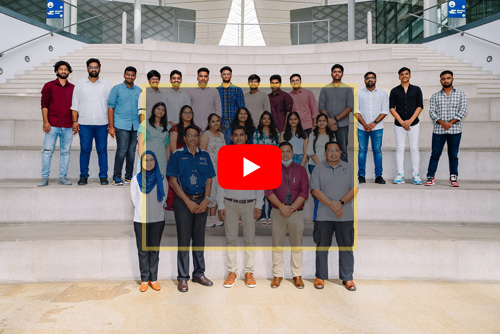 21 students from the first batch of students from SRM University-AP, Andhra Pradesh, has completed the Familiarisation Programme at Universiti Teknologi PETRONAS (UTP), Malaysia in the month of June. This is part of Global Immersion facilitated by the Office of International Relations and Higher Studies at SRM AP.
21 students from the first batch of students from SRM University-AP, Andhra Pradesh, has completed the Familiarisation Programme at Universiti Teknologi PETRONAS (UTP), Malaysia in the month of June. This is part of Global Immersion facilitated by the Office of International Relations and Higher Studies at SRM AP.Students and faculty mentors from SRM AP participated in several on and off-campus activities such as campus tours, cultural exchange, and recreational activities in UTP Malaysia. There were educational trips to Kuala Lumpur and PETRONAS Twin Towers. The students were accompanied by Dr Sunil Chinnadurai, Assistant Professor at SRM University-AP.
In the five-day programme, SRM University-AP students enrolled in two non-credited courses – Introduction to Technical Reporting & Latex Scripting and Data Analysis with R Statistics. The students were introduced to UTP’s facilities, programmes, research capabilities, and campus life as a part of the Familiarisation Programme.
UTP Centre for Student Development (CSD) thanked SRM University-AP for entrusting them to provide our students with a global experience by participating in this programme.
“I had both educational and fun-filled activities throughout the week in Malaysia”– Samardh, 3rd year, CSE
“Thanks to the office of IR and HS for giving us exposure abroad”– Laasya, 3rd year, BBA
“Short courses made big difference in the thinking and learning process of students”– Bharath, 3rd year, CSE
“UTP is a place of cheer, civility, and friendship. I thank SRM AP for this wonderful opportunity”– Sukhdev, 3rd year, CSE
Continue reading → - Two paper presentations at the 4th International Conference on Energy, Power, and Environment July 1, 2022
Two research papers from the Department of Computer Science and Engineering were presented at the 4th International Conference on Energy, Power, and Environment held from April 29 to May 1, 2022. Assistance professor V M Manikandan and three BTech students participated in the conference organised by NIT Meghalaya, India. The papers will be published in IEEE Xplore Digital Library (Scopus Indexed).
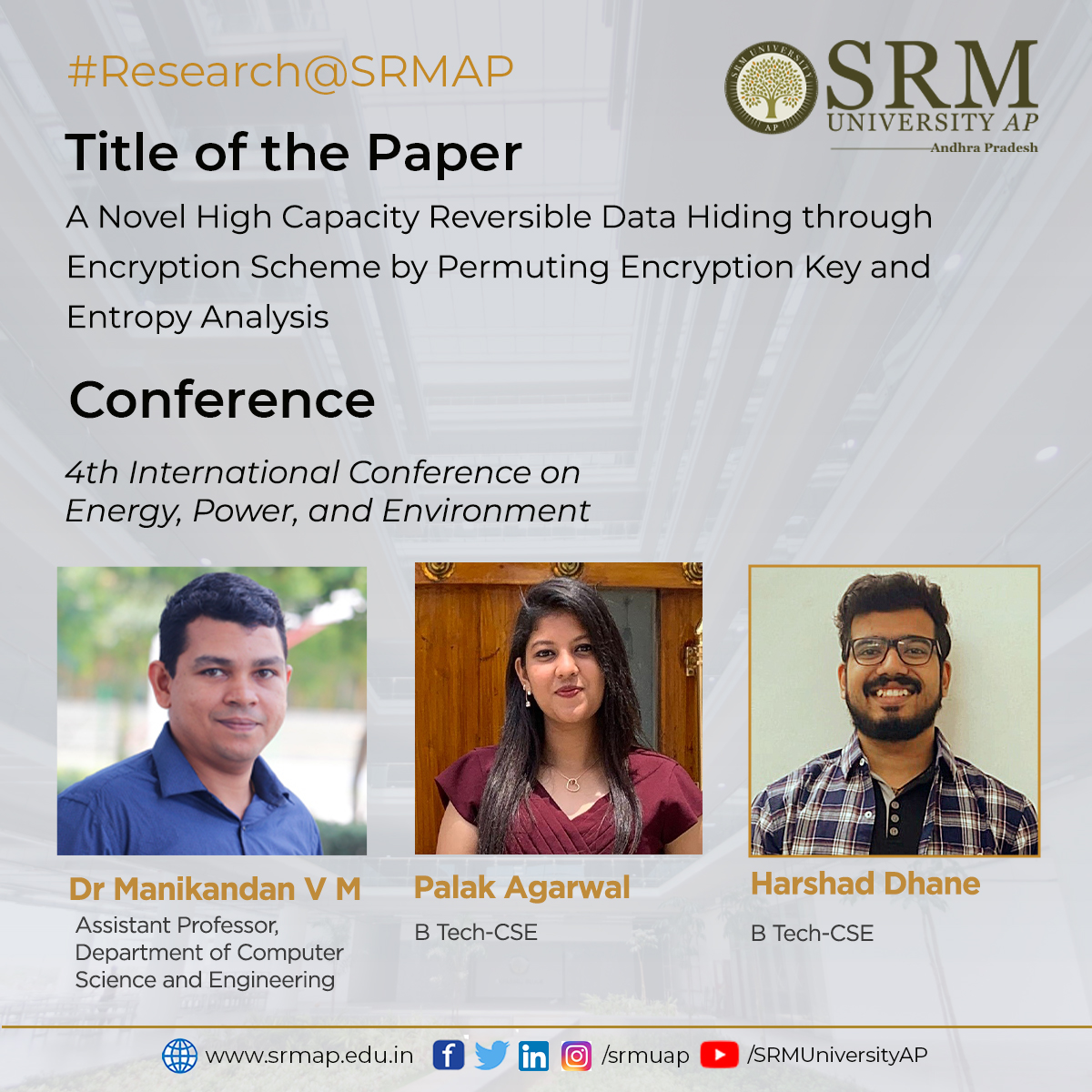 Third-year BTech CSE student Harshad Dhane presented the paper A Novel High Capacity Reversible Data Hiding through Encryption Scheme by Permuting Encryption Key and Entropy Analysis, co-authored by Palak Agarwal, third-year BTech student, and Dr V M Manikandan. The reversible data hiding scheme proposed by the research can be used in the healthcare sector to transmit electronic patient reports along with medical images. Improving the embedding rate of the reversible data hiding is the further plan of the researchers.
Third-year BTech CSE student Harshad Dhane presented the paper A Novel High Capacity Reversible Data Hiding through Encryption Scheme by Permuting Encryption Key and Entropy Analysis, co-authored by Palak Agarwal, third-year BTech student, and Dr V M Manikandan. The reversible data hiding scheme proposed by the research can be used in the healthcare sector to transmit electronic patient reports along with medical images. Improving the embedding rate of the reversible data hiding is the further plan of the researchers.Explanation of the research
A Reversible Data Hiding Through Encryption (RDTE) scheme will consider an original image and a sequence of bits as the input and generate an encrypted image as the output. This encrypted image will be able to transmit through the network securely, and the authorized receiver can take out the hidden details along with the restoration of the actual image. This paper proposes a new RDTE scheme with a good rate of embedding without any issues during the restoration of the original image. The researchers used the well-known RC4 pseudo-random generator for the image encryption and performed data hiding during block-wise image encryption. In the proposed scheme, the original image is considered non-overlapping blocks of size BXB pixels, and these blocks will be encrypted using a sequence of pseudo-random integers. During the RDTE process, all the possible unique permutations of the encryption key, K, will be generated, say (K0, K1,…, KN). Further, the sender will be capable of embedding one integer value from the set {0, 1, …,N} in a selected image block. A selected block will be encrypted using the pseudo-random sequence of integers using the key K_Q to embed the integer Q in the selected block. The proposed scheme prefers to select keys with unique characters with sufficient length to ensure the maximum embedding capacity. The message extraction and image restoration are performed by analysing the entropy measure from each block after attempting the decryption.
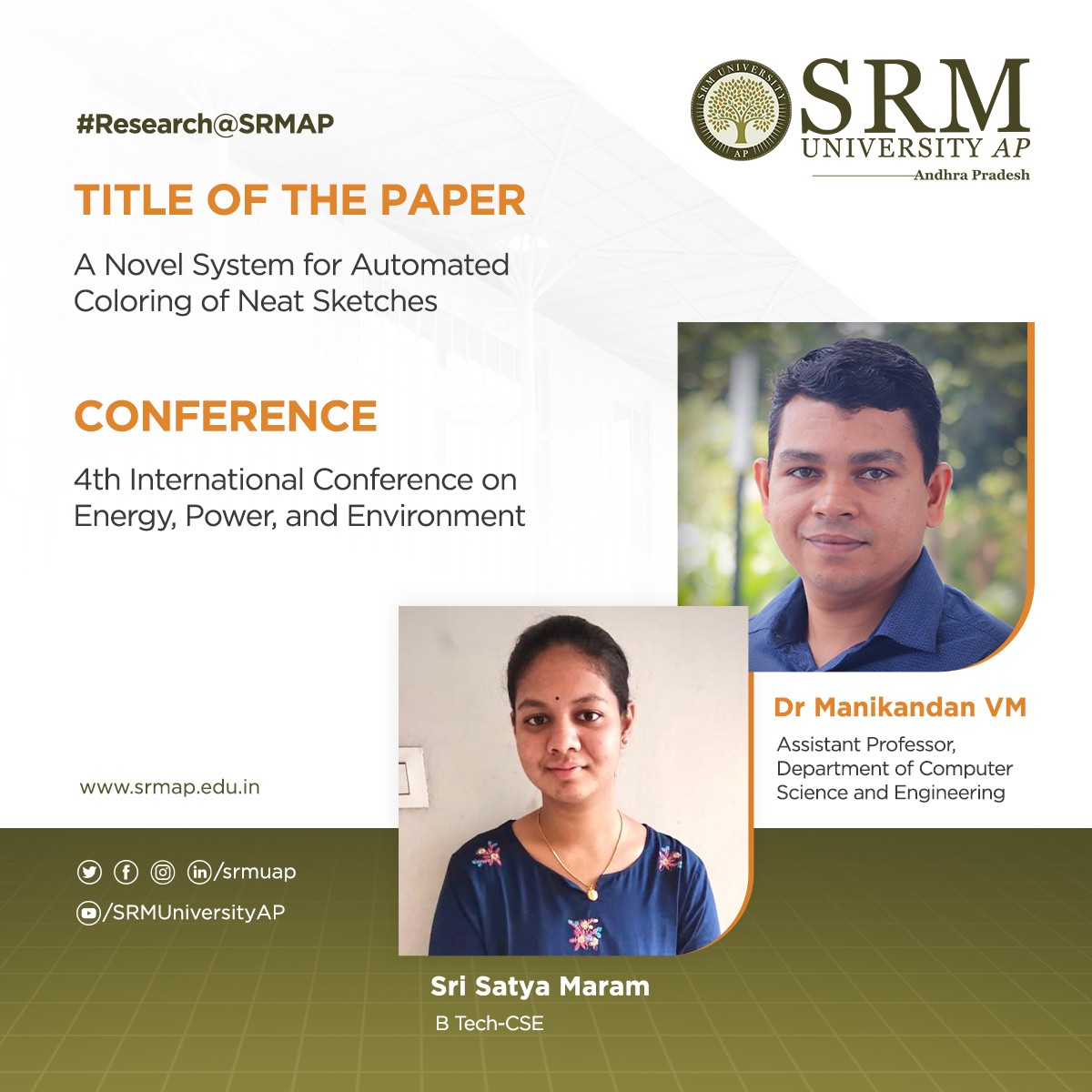 The paper presented by second year BTech CSE student Sri Satya Maram is titled A Novel System for Automated Coloring of Neat Sketches and was co-authored by Dr V M Manikandan. The research introduces a new algorithm to colour a given neat sketch. The proposed algorithm can be used to colour drawings to create animated movies or to colour the designs developed by the designers. The researchers plan to develop artistic features on the coloured image for better visual appearance.
The paper presented by second year BTech CSE student Sri Satya Maram is titled A Novel System for Automated Coloring of Neat Sketches and was co-authored by Dr V M Manikandan. The research introduces a new algorithm to colour a given neat sketch. The proposed algorithm can be used to colour drawings to create animated movies or to colour the designs developed by the designers. The researchers plan to develop artistic features on the coloured image for better visual appearance.Explanation of the research
The process of colouring neat sketches is a significant activity when making animated movies or for better visualization in computer modelling. The colour filling tools are widely available in almost all the image/video editing software, which will help us pick a colour from a colour palette and can be filled in a selected region. This process is known as flat colouring. The flat colouring process has several challenges. One of the significant challenges is that the colour may leak from the selected regions to neighbouring regions if there are some small openings on the contours. The second concern while using flat colouring is that the designated areas will be filled entirely with the same colour, so the drawing will not have an artistic look. The research proposes a new software application that will take a neat sketch as the input, and the system will generate a coloured drawing as the output. In the proposed scheme, the researchers have converted the given sketch to a grayscale or binary image and applied image dilation operation to fill the small open spaces in the contours (if any). Further, the closed regions are identified and coloured with a predefined set of colours or random colour combinations. While colouring the regions, the proposed system will ensure that the adjacent regions will not be coloured with the same colours. A number of sketches have been considered during the experimental study, and the results are validated manually.
Continue reading → - Computational intelligence and the healthcare system June 30, 2022
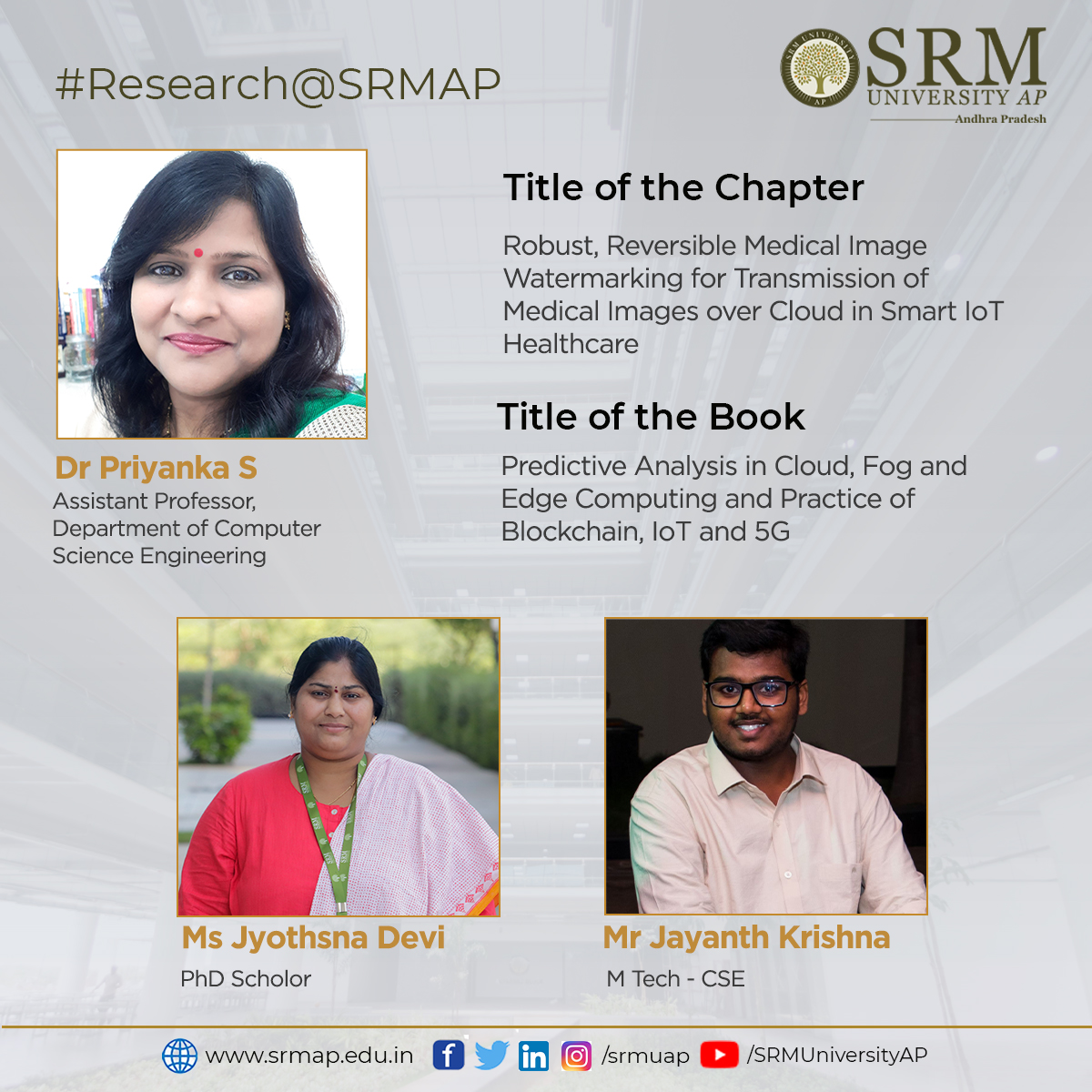 Computational and artificial intelligence is enjoying an unparalleled relevance in the modern world. They improve people’s lives and are highly anticipated in the healthcare industry. Research in this domain is hugely appreciated by the contemporary world, considering its potential to create revolutionary changes in the health care system. The Department of Computer Science and Engineering is delighted to inform you that the paper Robust, Reversible Medical Image Watermarking for Transmission of Medical Images over Cloud in Smart IoT Healthcare has been accepted for publishing as a chapter in the book Predictive Analysis in Cloud, Fog and Edge Computing and Practice of Blockchain, IoT and 5G.
Computational and artificial intelligence is enjoying an unparalleled relevance in the modern world. They improve people’s lives and are highly anticipated in the healthcare industry. Research in this domain is hugely appreciated by the contemporary world, considering its potential to create revolutionary changes in the health care system. The Department of Computer Science and Engineering is delighted to inform you that the paper Robust, Reversible Medical Image Watermarking for Transmission of Medical Images over Cloud in Smart IoT Healthcare has been accepted for publishing as a chapter in the book Predictive Analysis in Cloud, Fog and Edge Computing and Practice of Blockchain, IoT and 5G.The paper was submitted by Assistant Professor Dr Priyanka S, her PhD student Ms Jyothsna Devi, and MTech student Mr Jayant Krishna. The book chapter for the edited book is entitled Predictive Data Security using Ai – Insights and Issues of Blockchain, IoT, and DevOps and is published by Springer Nature. It is a part of the book series, Studies in Computational Intelligence, indexed by SCOPUS.
The book Studies in Computational Intelligence targets to bring together researchers and practitioners in computational intelligence and AI technology, especially those related to the areas of Machine learning, blockchain, multimedia using AI, smart IoT environment and email spam and online surveys, and many more recent emerging fields. The research work mainly provides highly secure, robust medical image transmission over the cloud in a smart IoT healthcare environment to ensure high embedding capacity and integrity.
This book’s target audience comprises professionals and researchers working in the field of computational intelligence and AI for health services in a smart environment. The book will attract Engineers (computer, industrial, software, and others), health care scholars, and information scientists since it caters to their interests.
Continue reading → - Make it into the best B schools across the globe June 30, 2022
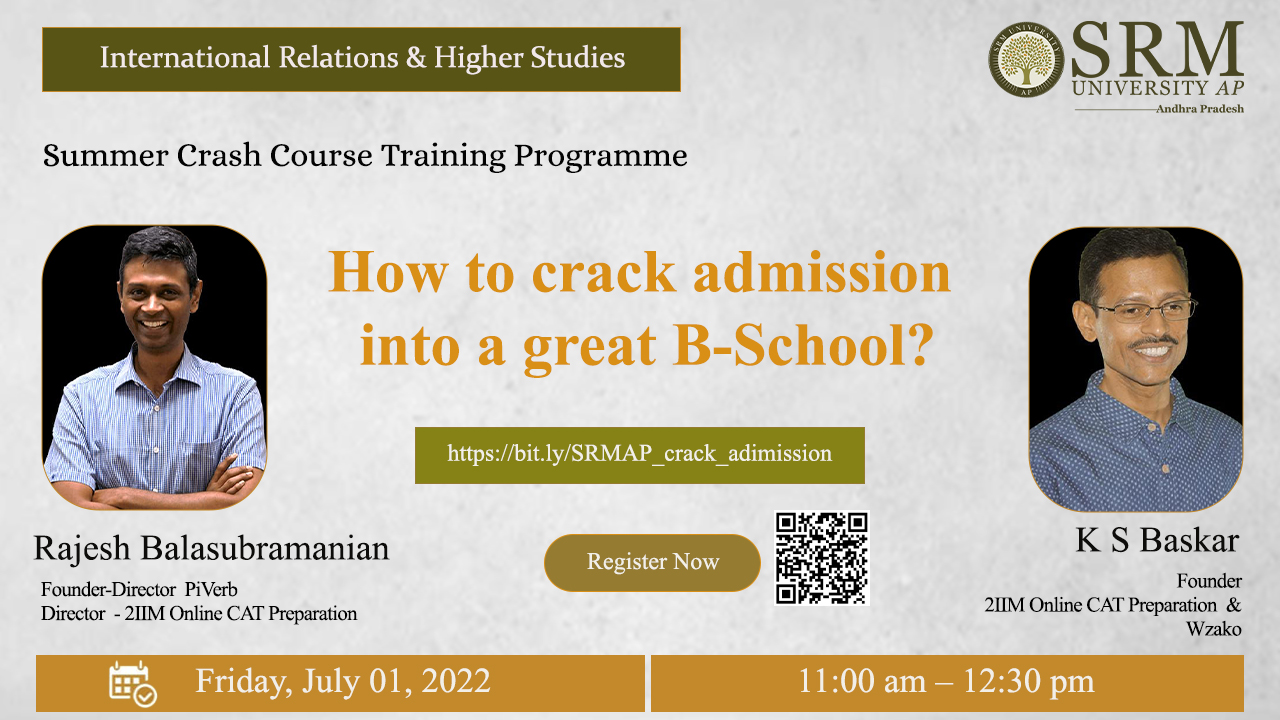
Are you an aspiring business enthusiast seeking to learn from the top-tier B schools in the world? Do you wish to hone your business acumen with effective training and expert guidance? We present to you an opportunity to ready yourselves up to land up in the business school of your choice. The Office of International Relations and Higher Studies has scheduled a webinar on ‘How to Crack Admission into a great B-School’, with the leading educational experts Mr Rajesh Balasubramanian and Mr K S Baskar, as part of their Summer Crash Course Training Programme.
Date: July 01, 2022
Time: 11 am to 12.30 pm
Millions of ambitious students are enrolling in business management courses both inside and outside the country. The leading business schools offer courses that introduce students to different facets of business and impart them the necessary skills to hold management and leadership positions in any field of work. Having countless institutions to choose from, serious thought must be given to choosing the right school and shaping oneself with the relevant knowledge and skill set to grab admission there.
Speakers’ Profiles
Mr Rajesh Balasubramanian is an Electrical Engineer from IIT, Madras, Class of 2001 and completed his PGDM from IIM Bangalore in 2003. He runs 2IIM’s CAT program and has built most of the content for the 2IIM CAT Online Course.He scored 100th percentile in CAT 2011, CAT 2012, CAT 2014 and CAT 2017. Rajesh also runs PiVerb – an Ed-Tech company that focuses on teaching math intuitively to students from class V to class X.
Mr K S Baskar founded 2IIM and continues to head the parent company. He is a Mechanical Engineer from College of Engineering, Guindy, Class of 1991 and completed his PGDM from IIM Calcutta in 1994. Baskar runs Wizako, the Market leader for online coaching for GMAT and GRE in India. Baskar has been a trainer for 25 years and has mentored more than 25000 students. Several of his students are graduates from IIM A, B, C, Harvard, Wharton and Stanford.
Join the webinar with Mr Rajesh Balasubramanian and Mr K S Baskar as they walk you through an exciting journey into the elite B Schools you’ve always dreamt of.
Continue reading → - Fascinating overseas internship in Germany with SRM AP June 29, 2022
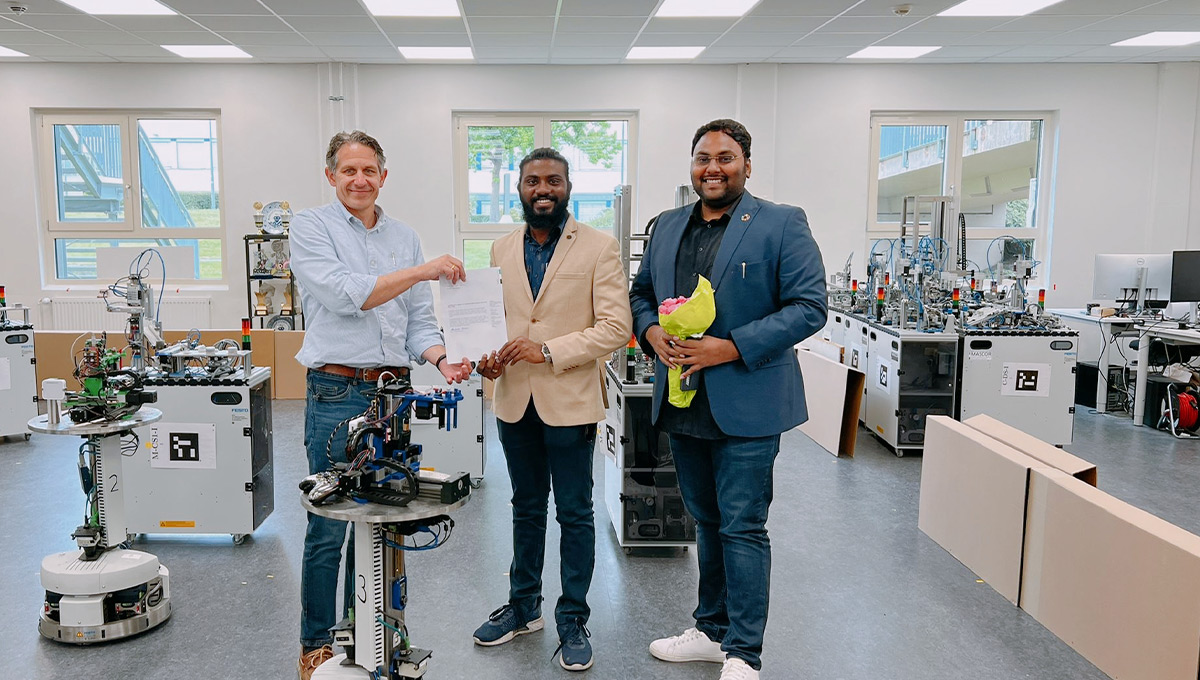 The results will be astonishing when hard work goes hand in hand with smart work. Vanteddu Nikhileswar from the Department of Mechanical Engineering at SRM University-AP preferred to believe in this strategy and has successfully completed an Internship and Project at MASCOR Institute in FH Aachen University, Germany.
The results will be astonishing when hard work goes hand in hand with smart work. Vanteddu Nikhileswar from the Department of Mechanical Engineering at SRM University-AP preferred to believe in this strategy and has successfully completed an Internship and Project at MASCOR Institute in FH Aachen University, Germany.Nikhileswar got the opportunity to do an Internship and the International Project Exchange Programme at Mobile Autonomous Systems and Cognitive Robotics Institute through Indo Euro Synchronization (IES), an organisation providing educational and research programmes beyond borders. Even though affected by the Covid-19 restrictions, he completed the project and internship that lasted 6 months with an excellent quality of work.
Expert guidance
Under the guidance of Dr Alexander Ferrein, Director of MASCOR Institute, Nikhileswar worked on his project “Webots Simulation of Spot Robot for Rescue League”. The project’s target was to create a bezier curve, find the inverse kinematics for spot Robot and Robot programming in ROS, and develop a webots simulation for the spot Robot and Quadruped gait to improve the motion capabilities in the webots simulation environment.
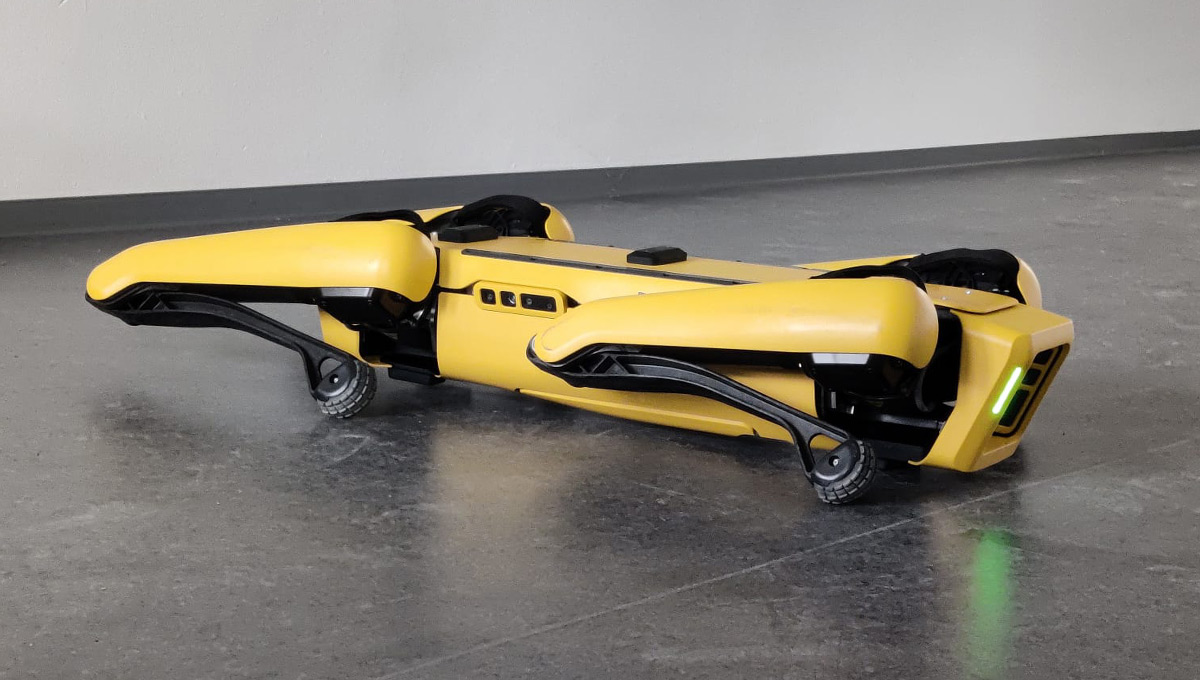
Priceless exposure
The skilled learning sessions with the scholars at the institute were a valuable addition to the career growth of Nikhileswar. While working in Germany, he was able to visit well-known companies and industries, which provided the opportunity to interact with many students and working professionals. This helped him to gain enormous clarity regarding different aspects of work opportunities and life as a whole.
Note of gratitude
He was thankful to the Indo Euro Synchronization President, Mr Venkat Raj, the management of SRM university-AP, Prof. Prakash Jadav, and Dr Pramod Jammy. The special guidance of Dr Starke, founder of MASCOR Institute, and Dr Alexander Ferrein, Director of MASCOR Institute FH Aachen University, holds a crucial role in his project work and internship.
Added accomplishment
Apart from the project, he has also secured admission at RWTH Aachen University for the Masters in Management and Engineering in Production Systems (MME-PS). This university ranks 147 Globally in QS Ranking 2023 and Ranks 19 QS World University Rankings by Subject 2022: Mechanical, Aeronautical & Manufacturing Engineering.
Continue reading →


